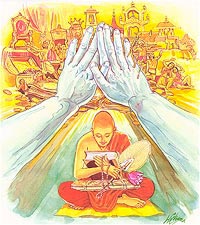28 02 2012 LESSON 538 The
Dhammapada Verses and Stories Dhammapada Verse 84 Dhammikatthera Vatthu The
Wise Live Correctly
FREE ONLINE eNālandā Research & Practice UNIVERSITY & BUDDHIST GOOD NEWS LETTER Through :http://sarvajan.ambedkar.org
THE BUDDHIST ON LINE GOOD NEWS LETTER
COURSE PROGRAM
LESSONS 538
Practice
a Sutta a Day Keeps Dukkha Away

Verse 84. The Wise Live
Correctly
Neither
for one’s own, nor for another’s sake
one should wish for children, wealth, estate,
nor success desire by means unjust,
thus virtuous, and wise, righteous one would be.
Explanation:
Not for one’s own benefit nor for that of others, does he desire children,
wealth or kingdom. Nor does he desire self-glory. Thus he is realistic,
penetrative and well behaved.
Dhammapada Verse 84
Dhammikatthera Vatthu
Na
attahetu na parassa hetu
na puttamicche na dhanam na rattham
na iccheyya adhammena samiddhimattano
sa silava pannava dhammiko siya.
Verse
84: For his own sake or for the sake of others, he does no evil; nor does he
wish for sons and daughters or for wealth or for a kingdom by doing evil; nor
does he wish for success by unfair means; such a one is indeed virtuous, wise
and just.
The
Story of Thera Dhammika
While
residing at the Jetavana monastery, the Buddha uttered Verse (84) of this book,
with reference to Thera Dhammika.
Dhammika
lived in Savatthi with his wife. One day, he told his pregnant wife that he
wished to become a bhikkhu; his wife pleaded with him to wait until after the
birth of their child. When the child was born, he again requested his wife to
let him go; again, she pleaded with him to wait until the child could walk.
Then Dhammika thought to himself, “It will be useless for me to ask my
wife for her approval to join the Order; I shall work for my own liberation.”
Having made a firm decision, he left his house to become a bhikkhu. He took a
subject of meditation from the Buddha and practised meditation ardently and
diligently and soon became an arahat.
Some
years later, he visited his house in order to teach the Dhamma to his son and
his wife. His son entered the Order and he too attained arahatship. The wife
then thought, “Now that both my husband and my son have left the house,
I’d better leave it, too.” With this thought she left the house and became
a bhikkhuni; eventually, she too attained arahatship.
At the
congregation of the bhikkhus, the Buddha was told how Dhammika became a bhikkhu
and attained arahatship, and how through him his son and his wife also attained
arahatship. To them the Buddha said, “Bhikkhus, a wise man does not
wish for wealth and prosperity by doing evil, whether it is for his own sake or
for the sake of others. He only works for his own liberation from the round of
rebirths (samsara) by comprehending the Dhamma and living according to the Dhamma.”
Then
the Buddha spoke in verse as follows:
| Verse 84: For his own sake or for the sake of others, he does no evil; nor does he wish for sons and daughters or for wealth or for a kingdom by doing evil; nor does he wish for success by unfair means; such a one is indeed virtuous, wise and just. |